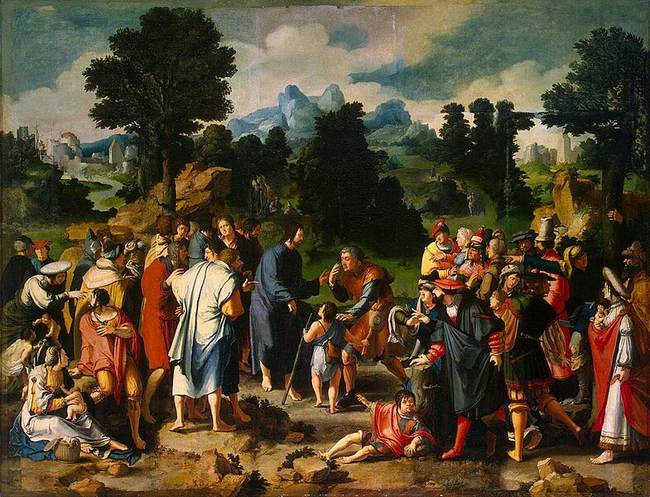This morning’s Gospel reading is Mark 10:46–52:
As Jesus was leaving Jericho with his disciples and a sizable crowd, Bartimaeus, a blind man, the son of Timaeus, sat by the roadside begging. On hearing that it was Jesus of Nazareth, he began to cry out and say, “Jesus, son of David, have pity on me.” And many rebuked him, telling him to be silent. But he kept calling out all the more, “Son of David, have pity on me.” Jesus stopped and said, “Call him.” So they called the blind man, saying to him, “Take courage; get up, Jesus is calling you.” He threw aside his cloak, sprang up, and came to Jesus. Jesus said to him in reply, “What do you want me to do for you?” The blind man replied to him, “Master, I want to see.” Jesus told him, “Go your way; your faith has saved you.” Immediately he received his sight and followed him on the way.
How many of us can recall being told as kids, “It will all end in tears!”, or some other parental warning about childish shenanigans. We’d roughhouse with each other or do stupid things that we’ll remember with astonishment about not losing a life or limb for doing. I’m not sure if my parents ever put it precisely in that way; they were more likely to tell us If you get hurt doing that, don’t come running to me.
Readers probably can recall their own such antics with a measure of nostalgia and mild embarrassment. With luck, we heal up from these misadventures and become restored for more of them. In the spiritual sense, though, we need more than just time and a few good bandages. We need to recognize our failures and put ourselves on the road to restoration through faith in the Lord who provides it.
In today’s Gospel, Jesus heals the blind Bartimaeus while traveling out of Jericho. For those who have not traveled to the Holy Land, Jericho is an oasis in an otherwise inhospitable region. It is the lowest city in the world, over 250 meters (846 feet) below sea level, surrounded by desert but sustained by springs within the city itself. Begging outside of Jericho would be a desperate act today, let alone in the time frame of the Gospel.
Jesus certainly would have understood that, but it’s telling how the crowd dismisses it at first. Why would they rebuke a poor beggar for crying out to their teacher? The implication is that the crowd either was jealous for Jesus’ attention or simply dismissive of the poor and downtrodden. Mark does not say explicitly that Jesus rebuked them in return for their dismissiveness, but He does so in other passages in similar circumstances.
Whatever the reason, the crowd is so caught up in their own desires that they miss the voice of the poor and yet still faithful — but Jesus hears it and responds. Bartimaeus asks for His intervention, in the form of a prayer, to call out to Him: “Son of David, have pity on me.” We use a similar form today to humble ourselves to ask for forgiveness in the “Jesus Prayer”: Lord Jesus Christ, Son of God, have mercy on me, a sinner. Jesus responds to Bartimaeus’ prayer by recognizing his faith and healing him through it.
And what does Bartimaeus do? He follows Jesus after having received healing. Bartimaeus recognized his restoration through faith in the Lord. Bartimaeus’ journey began in tears and ends in joy, having discovered salvation through prayer and humility.
Each of us has the same need as Bartimaeus, even if we are too blind to recognize it at times. Paul talks about this in his letter to the Hebrews (5:1-6), in which he describes himself and the rest of the Apostles as flawed men. Paul does not proselytize because he has been made perfect, but because he fully sees his weaknesses in Christ, who allows him to use them for the sake of salvation:
Every high priest is taken from among men and made their representative before God, to offer gifts and sacrifices for sins. He is able to deal patiently with the ignorant and erring, for he himself is beset by weakness and so, for this reason, must make sin offerings for himself as well as for the people. No one takes this honor upon himself but only when called by God, just as Aaron was.
It is through our tears that we understand the pain of the world. It is through our weakness that we understand our right relationship with the Lord. Only when we know we are blind and cast aside can we cry out, “Son of David, have pity on me,” and only when we know that about ourselves can we see the pain and isolation of our brothers and sisters.
Our pain and weakness in light of the Lord’s love is almost too great to bear when considered in depth. But the Lord promises that the road to salvation will only start in tears, not end in it. Foolishness leads us into death, but wisdom will bring us back to Him, Jeremiah writes in our first reading. Called the “weeping prophet” for his grief over the rebellion of Judah and its imminent destruction, Jeremiah later prophesies that the Lord will restore His people through their faith in Him:
Shout with joy for Jacob, exult at the head of the nations; proclaim your praise and say: The LORD has delivered his people, the remnant of Israel. Behold, I will bring them back from the land of the north; I will gather them from the ends of the world, with the blind and the lame in their midst, the mothers and those with child; they shall return as an immense throng. They departed in tears, but I will console them and guide them; I will lead them to brooks of water, on a level road, so that none shall stumble. For I am a father to Israel, Ephraim is my first-born.
We depart from the Lord in tears, but we return to Him in joy, restored to His adoption as His sons and daughters. But we cannot recognize that without accounting for our weaknesses and transgressions, and we cannot evangelize without recognizing our humble position and common status as sinners with the rest of humanity. Only then can we be filled with joy — by praying as Bartimaeus did for our own healing from the folly of sin.
Previous reflections on these readings:
The front page image is “Healing of the Blind Man of Jericho” by Lucas van Leyden, 1531. On display at the Hermitage Museum. Via Wikimedia Commons.
“Sunday Reflection” is a regular feature, looking at the specific readings used in today’s Mass in Catholic parishes around the world. The reflection represents only my own point of view, intended to help prepare myself for the Lord’s day and perhaps spark a meaningful discussion. Previous Sunday Reflections from the main page can be found here.
Read the full article here




![NYC’s Dem Mayor Adams Defends Donald Trump Ahead Of Madison Square Garden Rally [WATCH] NYC’s Dem Mayor Adams Defends Donald Trump Ahead Of Madison Square Garden Rally [WATCH]](https://www.rvmnews.com/wp-content/uploads/2024/09/2024.09.12-08.37-rvmnews-66e35108c1ff5.jpg)

![‘We Will Not Comply, This Is a Declaration of War’ [WATCH] ‘We Will Not Comply, This Is a Declaration of War’ [WATCH]](https://www.rvmnews.com/wp-content/uploads/2024/08/2024.08.07-10.17-rvmnews-66b349aff3990.jpg)


